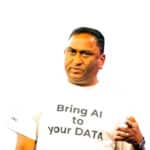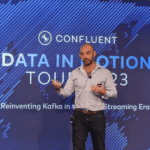
Over the last few years we all know there has been transformative changes in the workplace, the critical role of ...

At the hustling and bustling Melbourne Convention and Exhibition Centre, the 2024 edition of Cisco Live commenced with ...

Introduction
The often overlooked yet backbone for the Australian market - is small and medium-sized businesses (SMBs). ...
Motorola Solutions today unveiled the V200, a body camera designed specifically to help protect frontline workers in ...
Infoblox Threat Intel Research Sheds Light On The Use Of Spoofed Domains In Malicious Spam Campaigns
Infoblox Threat Intel researchers have discovered new insights into the use of spoofed domains in modern malicious spam ...
Sophos today announced that its Sophos Managed Detection and Response (MDR) service has reached a major milestone, now ...
Business News ↓
With demand for WatchGuard’s existing MDR service soaring, this acquisition lets MSPs easily add best-in-class MDR ...
Harnessing the power of software and hardware security to drive stronger ransomware detection for businesses, released at ...

In this episode, KB brings us the inside track at the AUKUS Advanced Technology Dialogue in Australia. Starting off with ...

Watch The Interview
Biography
Krish Vitaldevara is a passionate product leader and engineer with demonstrated ...

Many organisations feel they are adequately prepared for cyber security these days, due to the simple fact of having a ...

Phishing attacks, malware, social engineering, spear phishing, and credential stuffing are all cyber threats that have one ...

Securing information assets to be resilient against a broad spectrum of threats is a journey many Australian organisations ...

While the physical security measures in place within many banks today are impressive - large vaults, bullet-proof glass, ...

As the digital world continues to dominate the banking industry, concerns about data security and privacy are coming to ...

As quantum computing technology advances, traditional cryptographic protocols are at risk, prompting regulatory bodies to ...

The Government should consider making data on ransoms paid for cyber attacks public to educate industry about the scale of ...

When designing a comprehensive data protection and privacy strategy, it’s best practice to aim higher than the current ...

In this episode, KB brings us the inside track at the AUKUS Advanced Technology Dialogue in Australia. Starting off with ...

At the hustling and bustling Melbourne Convention and Exhibition Centre, the 2024 edition of Cisco Live commenced with ...

In this episode, KB is joined by Tom Gillis, SVP and General Manager, Security Business Group, AJ Shipley, Vice President, ...
Markets & Trading
YOUR SECURITY NEWSFEED
The KBI Dossier
The Cybersecurity news feed delivered straight to your Inbox.
Technology News ↓

At the hustling and bustling Melbourne Convention and Exhibition Centre, the 2024 edition of Cisco Live commenced with ...

While identity-related threats are increasingly challenging, a well-implemented PAM strategy can transform security ...
Cybercrime rates in Australia have surged, with online attacks averaging out to one every six minutes, according to the ...

Kristen Verderame, Vice President of Global Government Relations at NetApp, shared the importance of government relations, ...

Introduction
The discovery of a leaked access token earlier this year that could have opened the door to malicious code ...

CISOs must display leadership and empower their organisations to benchmark and optimise security performance. By doing ...

Richard Seiersen, Chief Risk Tech Officer at Qualys shares six key predictions for the cybersecurity industry in 2025.

Rajesh Khazanchi, co-founder and CEO of ColorTokens, writes how breach ready strategies and AI-powered cyber defense can ...

As quantum computing advances, the standards for Post-Quantum Cryptography (PQC) are evolving rapidly, with governments ...

Agnidipta Sarkar, VP CISO Advisory, explores how Nassim Taleb's concept of antifragility enhances cyber defense strategies.

Learn the top 10 reasons to implement microsegmentation in your cybersecurity strategy. Protect against malware, ...

Discover why microsegmentation is vital for breach readiness. Learn how it prevents lateral movement, protects sensitive ...

NetApp INSIGHT 2024, held in Las Vegas in September, served as a pivotal event for data management and cloud innovation ...

So much is going on with NetApp according to Jeff Baxter, Vice President of Product Marketing at NetApp. Baxter provided ...

Introduction
Data protection is no longer an afterthought but a daily priority for businesses. While Australia's ...

Rising cybercrime rates in Australia and New Zealand are an escalating concern as cybercriminals aren't necessarily ...

Tom Casey Senior Vice President, Products & Technology at Splunk recently presented at Cisco Live in Melbourne about ...

NetApp INSIGHT 2024, held in Las Vegas in September, served as a pivotal event for data management and cloud innovation ...
The use of cyberattacks in executing modern warfare, which is already happening, will enter public awareness
A major ...

Introduction
In today’s digital landscape, safeguarding sensitive information, be it in transit, at rest, or in use, has ...

With the benefit of hindsight, we can now look back and understand some of the cyber security missteps of 2023 to ...
Intelligence company Recorded Future today released the latest report from its threat research division Insikt Group - ...
Since 2020, Forescout Research - Vedere Labs has been tracking the riskiest devices on organisations’ networks. In 2020, ...

As insurers impose stricter limitations, manufacturers must revise their risk management strategies and implement ...

My question is, who’s regularly assessing to make sure those locks aren’t being picked, that the alarms haven’t been ...
Australian organisations should pay attention to 15 high risk vulnerabilities across Microsoft, Apple and Google. Some of ...
Five high risk vulnerabilities from March to watch out for in Microsoft, Adobe, Fortinet, and Samsung




































